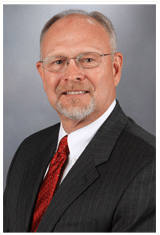JEFFERSON CITY, Mo. — Rep. Jay Barnes, R-Jefferson City, had Medicaid expansion proponents rejoicing when he offered a report showing $42 million in savings for the state by 2021 if the state expanded Medicaid eligibility.
When he challenged his fellow conservatives, many of whom have spoken against expansion, to refute his claim, it seemed a tacit endorsement of expansion from the Republican chairman of the House Interim committee on Medicaid transformation. Barnes, a respected young lawmaker, earned praise from Democrats and healthcare organizations and some consternation from his own party.

As the House appears to be inching closer to supporting a package that would expand Medicaid eligibility but also move some recipients onto private insurance programs with state subsidies, their counterparts on the Senate Medicaid Committee are shying away from expansion.
The first draft of a report for the Senate Committee on Medicaid Transformation and Reform was discussed during a work session for the first time this week in a public setting. The report contains no provisions for expanding Medicaid eligibility, which angered committee Democrats
Senators Jamilah Nasheed, D-St. Louis City, Joseph Keaveny, D-St. Louis, and Paul LeVota, D-Kansas City, walked out of the committee hearing, refusing to return until the committee discussed the expansion of Medicaid eligibility.
“The overwhelming majority of the testimony we heard was in favor of Medicaid expansion,” LeVota says. “And yet I don’t see it mentioned here once.”
Committee chairman Sen. Gary Romine, R-Farmington, says expansion of Medicaid was never under his committee’s purview and his directive was to explore “transformation and reform,” of Medicaid, and only after said reforms could the expansion of the program be discussed.
Romine says it was never his intention to discuss Medicaid expansion until after the committee was able to recommend some reforms to it as it existed, and that he voiced that intention regularly with his committee.

“We’ve always known expansion wasn’t really possible right now,” Romine says. “We wanted to turn the focus on reform and transformation that way, down the road, we aren’t having discussions about expanding a system that doesn’t work.”
Democrats like LeVota said they felt a report that didn’t reflect overwhelmingly pro-expansion testimony was a “waste of time.” Keaveny even hinted he would consider drafting a minority report, if Senate Democrats decided it would be the best option.
Privately, Republican staffers are hoping reforms to Medicaid might be useful in bringing more adamantly anti-expansion members of the party to the negotiating table.
Romine expects unanimous Republican support of his report, but doesn’t anticipate any Democratic signatures. He wouldn’t comment on what, if any, chances an expansion bill originating in the House would have in the Senate, leaving open the question as to whether there is enough support in the upper chamber to pass any bill reflecting Barnes’ report.
The committee report is due, with signatures, by Dec. 15. However the committee has no further hearings scheduled.
Collin Reischman was the Managing Editor for The Missouri Times, and a graduate of Webster University with a Bachelor of Arts in Journalism.



